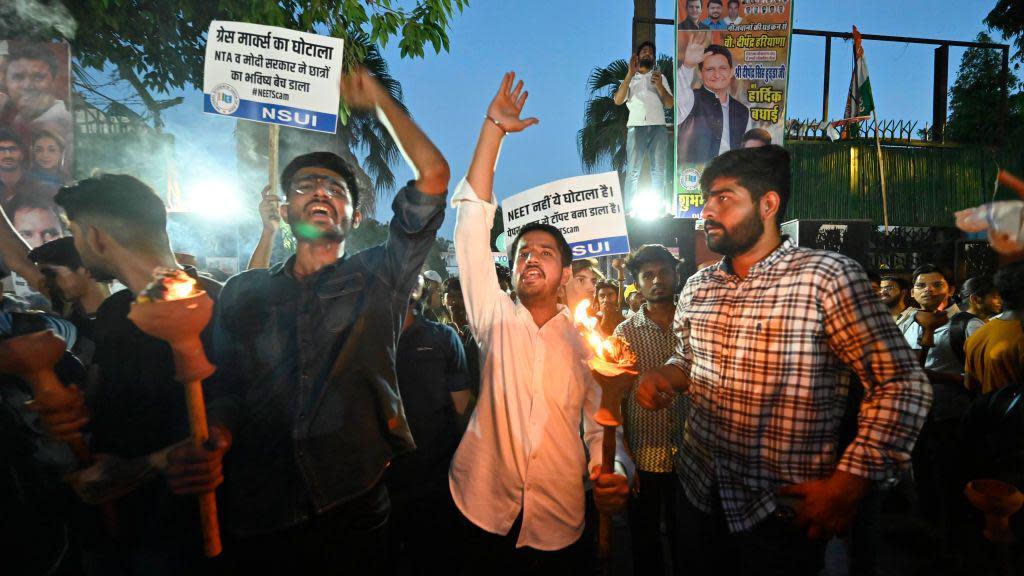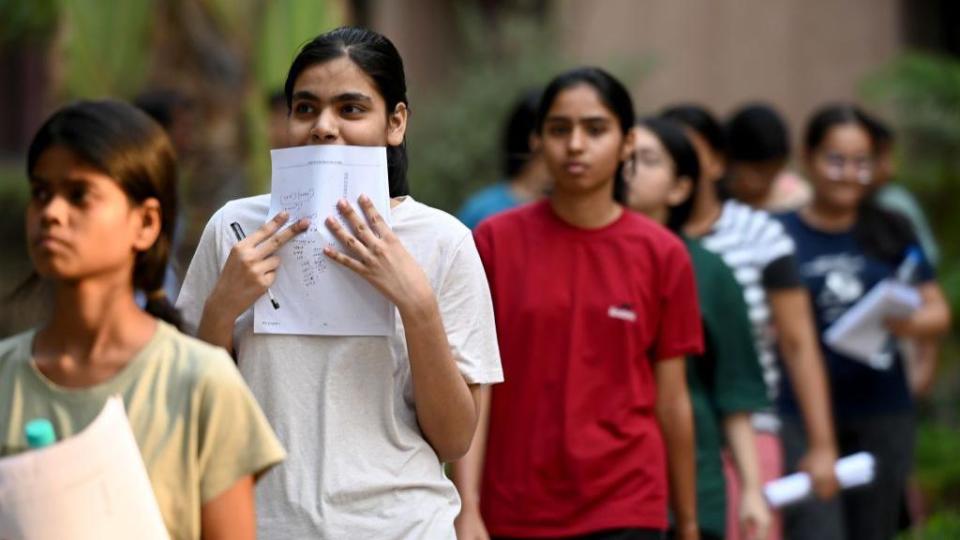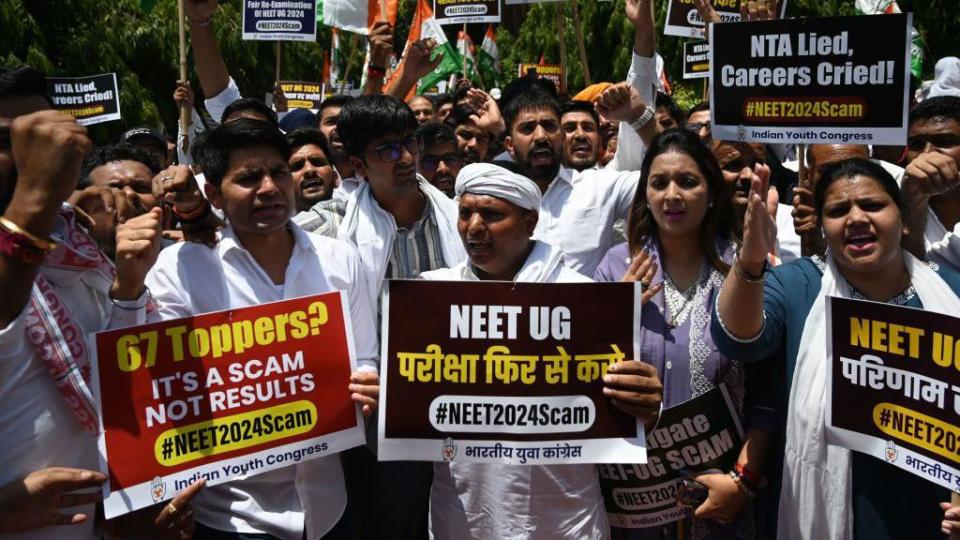Why an exam has sparked national outrage in India

A crucial medical exam in India has sparked anger, protests and allegations of cheating after thousands of candidates secured unusually high marks in this year’s test.
The National Eligibility Cum Entrance Test (Undergraduate), or NEET-UG is the gateway to studying medicine in the country, as its score is necessary for getting admission to a medical college. It is conducted by the National Testing Agency (NTA), a government organisation which holds some of India's biggest exams.
Millions of students take the exam every year, but only a small percentage get good enough marks to secure a college placement. But this year the challenge is somewhat different: too many candidates have got top marks, pushing down the ranking system and making it hard for even high-scorers to get admission.
Since the results were declared on 4 June, the exam has come under scrutiny for reasons ranging from errors in the question paper and grace marks (compensatory marks) being given in a faulty manner to allegations of paper leaks and fraud. Students and parents have demanded a re-test and dozens of petitions have been filed in courts to this end.
NTA officials have denied allegations of paper leaks, but on Sunday, federal Education Minister Dharmendra Pradhan admitted that “some irregularities” had come to light in certain exam centres. He said that no-one, including NTA officials, would be spared if irregularities were found.
On Tuesday, India's top court issued a notice to the NTA, saying that even if there was "0.001% negligence on the part of anyone it should be thoroughly dealt with".
But all this is small consolation for students who spend months or even years preparing for this highly competitive exam.
Tens of millions of students in India dream of getting into a good medical or engineering college every year - the professions command a lot of respect and also hold out hope for a steady, long-term income in a country with a jobs crisis.
This year, an astounding 2.4 million students competed for just 110,000 available seats in the NEET exam, underscoring the intense pressure and fierce competition faced by aspiring candidates.
Of the total seats, 55,000-60,000 seats belong to government-run colleges, while private colleges offer the rest. Half of the seats are reserved for underprivileged students.
Students flock to government colleges for their affordability. A five-year MBBS course in a government college costs between 500,000 and 1 million rupees ($5,992 - $11,984), whereas private colleges can charge up to ten times more.

What led to the controversy?
When results were announced on 4 June, it turned out that an unprecedented 67 students had achieved the perfect score of 720 marks.
Since 2016 - when NEET became the official entrance exam for medical colleges in India - only one to three students have got full marks each year, and sometimes not even that.
This year, there was also a significant increase in the number of candidates scoring in the high range of 650-680 marks, intensifying the competition for seats in India’s top medical colleges.
The unusual results sparked concerns among parents and students, who alleged irregularities in the exam's conduct and grading and called for an investigation.
But the NTA refuted these allegations, saying that the “integrity of the examination had not been compromised” and that there were more high scorers this year because more students had taken the exam.
It also said that 1,563 candidates were given "grace marks" for delays at exam centres and because a physics question turned out to have two correct answers. Notably, 50 out of the 67 top scorers achieved perfect marks due to these compensatory points.
But on 13 June, India’s top court cancelled the compensatory marks after several students filed petitions challenging the NTA’s decision, calling it “arbitrary” and “unfair”.
The Supreme Court also asked for students who had received grace marks to be given the option to take the test again - this is set to be held on 23 June.
But protesters say the court’s ruling doesn’t address the larger issues they raised, like allegations of paper leaks, cheating and systemic corruption.

The eye of the storm
Surbhi Sharma, 23, who attempted the exam for the fifth time this year and scored 650 marks, alleges that paper leaks - rampant in India - are behind the fluctuations in scores.
She noted that despite a significant increase in high scorers (in the 650-680 mark range), there was no similar rise in mid-range scorers (610-640 marks).
“NTA officials have said that more candidates got high scores because the paper was easier this year. But if that was the case, everyone should had done better and not just a section of the candidates,” she claims.
Dr Vivek Pandey, an activist assisting candidates with related court petitions, supports her stance.
On 1 June, he helped file a Supreme Court petition where 10 students requested that they be allowed to retake NEET, alleging the question paper was leaked at exam centres in Patna, the capital of Bihar state.
The Bihar police launched an investigation into the allegations shortly after the exam was conducted. On 10 May, they announced the arrest of 13 people, including four students, in connection with a paper leak case.
On 15 June, the police sent notices to nine more students suspected of being involved in the case, and asked them to join the investigation.
Manavjit Singh Dhillon, a senior police official, told the Times of India newspaper that the 13 accused had allegedly leaked the question paper to 30 candidates in a “safe house” a day before the exam in exchange for hundreds of thousands of rupees.
He told PTI news agency separately that during the course of the investigation, officials had recovered post-dated cheques and partially burnt papers and that they had sought question papers from the NTA for reference.
Besides accusations of paper leaks, the exam has faced additional allegations of cheating and fraud.
Police have arrested three people in Delhi and six in Rajasthan for allegedly impersonating NEET candidates to write the exam on their behalf. In Gujarat state, police arrested five people for their alleged involvement in a cheating plot at an exam centre in Godhra.
Political slugfest
The controversy has drawn criticism from opposition leaders who have accused the Bharatiya Janata Party (BJP)-led coalition government of "betraying the dreams" of millions of students.
Congress leader Mallikarjun Kharge questioned Prime Minister Narendra Modi’s silence on the issue and accused his government of “covering up the NEET scam”. The party has also demanded a Supreme Court-led investigation into the alleged irregularities.
Meanwhile, the Supreme Court is set to hear a clutch of petitions related to the NEET exam results - including ones asking for the test to be scrapped - on 8 July.

